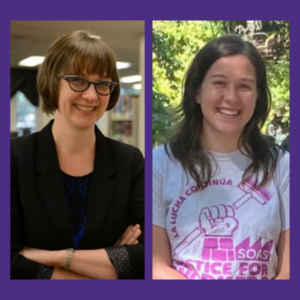 Authors:
Authors:
- Andrea Berg, she/her, Graduate Student, iSchool, University of Washington, Seattle campus
- Verletta Kern, she/her, Head of Open Scholarship Commons and Digital Scholarship Librarian at UW Libraries, University of Washington, Seattle campus
Project Description
In 2023, we launched the first year of the Open Scholarship Commons (OSC) Community Fellows Workshop Series. This project explores the instructional challenge of creating student-led peer-learning opportunities that lift up the expertise of marginalized students. The OSC is an interdisciplinary space with learning opportunities open to all students, faculty, and staff at the University, providing a chance to explore this challenge in a non-traditional educational space.
Recognizing a gap in student leadership opportunities in the growing field of open scholarship, the OSC designed the Community Fellows Workshop Series as a platform for graduate students underrepresented in the field of open scholarship to develop and present original workshops in their area of interest and expertise. Open scholarship aligns concepts of digital scholarship, which integrate scholarly methodologies and technical skills to create emerging forms of scholarship, together with the open movement, which strives to ensure that research results are shared as openly as possible for the sake of transparency and to foster innovation and collaboration for the public good.
The Fellowship positions students as teachers and experts in the field, offers compensation and mentorship for developing and delivering original workshops, and promotes peer-learning by offering workshops for students by students. At the time of writing, we have selected our first cohort of Fellows and are working with them to present their workshops in April of 2024.
Project Questions
How can the Libraries play a role in surfacing the work of underrepresented voices in the field of open scholarship?
How can we disrupt traditional teaching modalities by making space within the Libraries for student-led peer learning?
What mentoring needs can the Libraries support in order to help students develop and deliver workshops to their peers?
Context
The Open Scholarship Commons (OSC) is an interdisciplinary space in Suzzallo Library with the mission of advancing open, public, and emerging forms of scholarship. All OSC workshops are open to students, faculty and staff, and include in-person, remote, and hybrid offerings. The OSC is a compelling instructional setting because it is a non-classroom space where learners voluntarily seek out instruction. This creates an opportunity to experiment with new models for teaching and learning.
Methods
To surface underrepresented voices in the field of open scholarship, we secured funding to compensate Fellows at a competitive rate and foregrounded DEI questions in the application. Additionally, this is a resume building opportunity to advance Fellows’ careers.
To support Fellows in a successful student-led teaching experience, we created clear benchmarks to scaffold their workshop design, provided educational resources, connected them to relevant mentors, and fostered peer support among the cohort.
To foster a culture of mentorship, Fellows identified their mentorship needs and we contacted mentors with relevant expertise. Community building between Fellows and mentors, as well as amongst Fellows, is part of the Fellowship design.
Impact/Assessment
The OSC Community Fellowship impacts student learning by providing an opportunity for graduate students underrepresented in the field of open scholarship to connect with mentors who support their learning and leadership, take a leadership role in developing original workshops in their area of expertise, and present these workshops to their peers (creating additional student learning impacts for workshop participants).
- We will determine the success of these learning goals using the following criteria and measures:
- Did we successfully hire 3-4 graduate student Fellows? Yes/No
- Did we successfully support the Fellows individually and as a cohort? Measure attendance at 1:1 mentor meetings and cohort sessions
- Did the Fellows successfully develop and present original workshops that built open scholarship skills? Yes/No
- Did these workshops create peer learning opportunities led by marginalized students for the UW Community? Measure attendance at workshops
- Were workshops recorded and posted online to continue learning beyond the Fellowship and serve as resume building products for Fellows? Yes/No
- Was this experience beneficial for Fellows as a leadership and learning experience? Measure using feedback survey of Fellows at the end of Spring Quarter 2024
- Did we receive guidance from Fellows on improving future iterations of the program? Measure using survey of Fellows at the end of Spring Quarter 2024
Application
There are three main outcomes from this project which could be applied across instructional contexts:
- Valuing student-led learning: Student-led learning is an effective way to recognize student expertise and disrupt traditional top-down modes of instruction. Students are able to immerse themselves in topics of interest and relevance to their lives, offering a richer array of learning opportunities and building confidence through instructional leadership.
- Supporting student-led learning: Setting students up for success as teachers and experts requires a combination of mentorship, scaffolding, and peer support. In our case, mentors were knowledgeable in both the subject and in workshop design. Scaffolding created a timeline to ensure student success and a community agreement provided structure for peer support feedback.
- Appreciating non-classroom instructional spaces: Spaces like the OSC can provide alternative avenues for disrupting student/teacher hierarchies and offer opportunities for marginalized students to advance in their careers. Libraries have long been safe, non-judgmental spaces for students to engage in learning, and this Fellowship showcases the role they can play in supporting students as knowledge producers, and building up student expertise and resumes to advance future career goals.